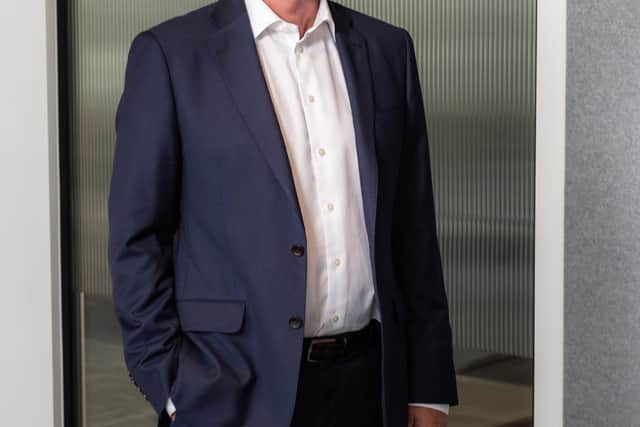Artificial intelligence can elevate the work of every human, says Sage's CEO Steve Hare
Steve Hare, the Yorkshire-born CEO of Sage, the UK’s largest listed technology company, takes a more positive view of AI’s potential. Used responsibly, he believes it could free us from drudgery and help businesses of all shapes and sizes raise their game. Thousands of Sage customers are already benefiting from using AI services, and the tech giant aims to become a leader in this fast growing space.
“We must see AI as something that can elevate the work of every human,’’ he said. “Every single customer I speak to tells me how difficult it can be to hire staff, particularly to do repetitive tasks.
Advertisement
Hide AdAdvertisement
Hide Ad"People want to add value right from the start of their careers,’’ he said. “The birth rate is declining and you have an aging population. I see a big opportunity for AI to transform lots of repetitive tasks and make us all more productive. It will allow us to elevate the work of craftsmen who have real skills. What's important is that we retain the ability to question what is presented to us by AI. It's important that we as humans make the final decisions.”


Mr Hare believes his grounded approach to corporate life can be traced back to his childhood in Withernsea, the seaside resort in the East Riding of Yorkshire.
“I have travelled around the world but I believe my Yorkshire background keeps my feet on the ground,’’ he said. “In Yorkshire, it's important to be humble and knuckle down and get things done."
This fierce work ethic helped Mr Hare become one of the FTSE 100’s youngest ever chief financial officers. He took on leading financial roles at three other listed UK companies before moving on to a senior operational role in private equity.
Advertisement
Hide AdAdvertisement
Hide AdHe believes his experience as an accountant gives him the edge as Sage's CEO. He wants technology to be the servant of accountants and entrepreneurs who must keep their eye on the balance sheet. The company he leads, Sage, was started by businessman David Goldman, with support from a team of Newcastle University students, in the early 1980s. It now reaches millions of customers across 21 countries. It employs 3,200 staff across the UK and Ireland with around 2,000 of these based in the global HQ in Cobalt in Newcastle. Mr Hare believes businesses must embrace the digital revolution.
"Digital does remove friction,’’ he said. “ I was chatting to an electrician recently and I explained to him that if, for example, he uses an app on his phone bills could potentially be paid in hours, instead of a paper-based process where it could all go on for weeks.
"The Government is pushing towards getting more and more transactions done digitally. Artificial intelligence could make payment flow seamless, so it frees up SMEs (small and medium-sized enterprises) to run their business. Time is the most precious thing for small businesses and our mission is to knock down barriers and get rid of friction. The Government can help by treating investment in technology like an investment in capital and infrastructure.”
There have been long-standing concerns about the need to boost the UK’s productivity.
Advertisement
Hide AdAdvertisement
Hide Ad“The best way to tackle this is to make the UK the best place to set up and run a business and technology can play a leading role in this,’’ said Mr Hare.
"Technology, for example, can help retailers do a much better job of cash flow forecasting. A lot of businesses still do their accounts manually. With technology, you don't need to write up your books, you can capture each transaction as it happens.
"The same process can apply to payroll. If people have a mobile workforce and expenses all these things can be brought into a digital environment.
" Instead of handing your accountant a shoebox of invoices, technology can remove friction from the process and people can make much better decisions. It's important to be very thoughtful about all your stakeholders. Small and medium-sized businesses are integrated into the local community and it's really important to be seen to embrace them.”
Advertisement
Hide AdAdvertisement
Hide AdSince the launch of its apprenticeship scheme in 2012, Sage has taken on around 400 apprentices and Mr Hare believes the UK needs to be more supportive of young people from a wide variety of backgrounds who have chosen a different path to going to university.
Last year, Sage invested £1.4m in developing the skills of young people across the North of England by working with the Institute of Engineering and Technology, the Newcastle United Foundation and the National Innovation Centre for Data. Sage’s investment is also focused on rethinking the role of education, particularly around the teaching of STEM (science, technology, engineering and mathematics) subjects.
Investment in STEM can drive long-term economic growth, while helping young people into sustainable careers, according to Sage.
"One of the worst problems facing Britain is digital inequality,’’ said Mr Hare. “We should aspire to everyone having access to superfast broadband. Between six and seven per cent of the population don't have access to superfast broadband, that's around 2m people.
Advertisement
Hide AdAdvertisement
Hide Ad"We wouldn't tolerate 2m people not having access to adequate healthcare. Although we are a commercial business, first and foremost, we believe that everyone thrives when we create greater equality and inclusion. It can be easier to set up a business than people think. People often overestimate how much access to capital they need to get started. You can often get a business started for as little as £1,000. You can start start small and experiment initially. People often talk about the lack of UK technology success stories. We are very much a sustainable, global UK success story, with 40 per cent of our revenue in the US. We take great pride in that."